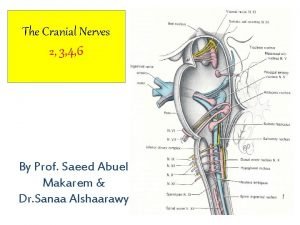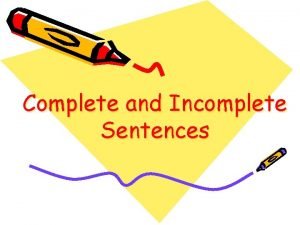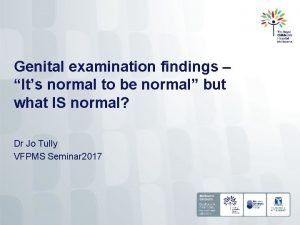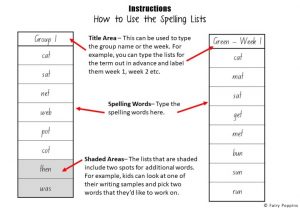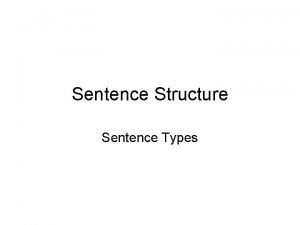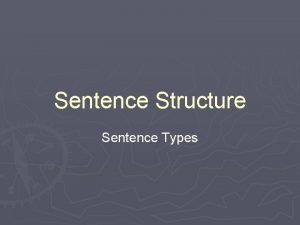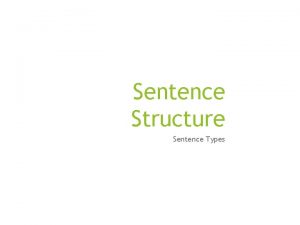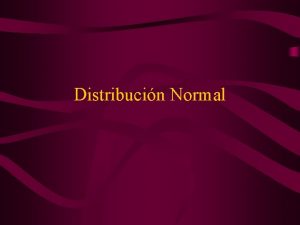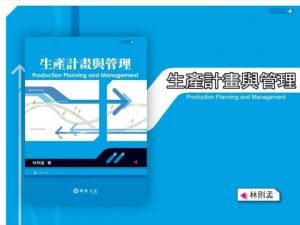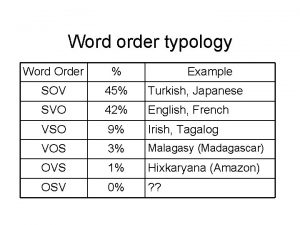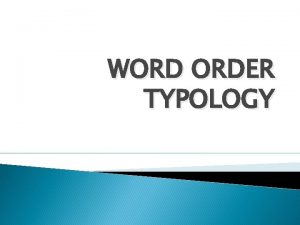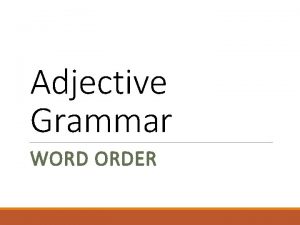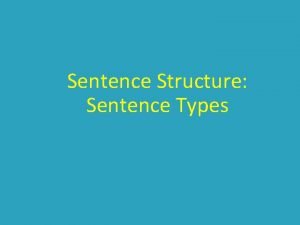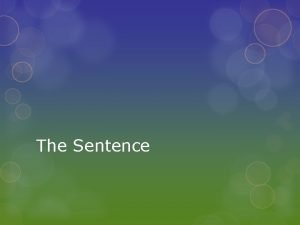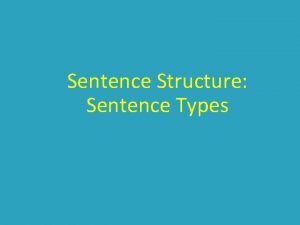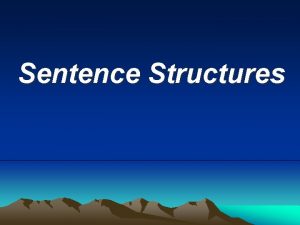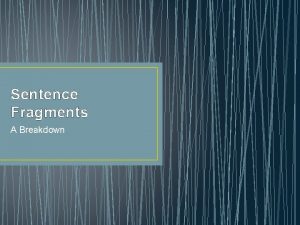The normal word order of a sentence is




















- Slides: 20

The normal word order of a sentence is vt. +object S(subject) +P(predicate) (主语) (谓语) vi. +adverbial link. v+predicative

Inversion a. the requirement of grammar The reasons for inversion: b. to stress c. to keep the sentence balance a. Do you like English? b. At the back of the classroom sit many teachers. c. They arrived at a house, in front of which sat a small boy.

a. In a lecture hall of a university sits a professor. 谓语 主语 b. Not only does he have to type out the (部分谓语) 主语 (部分谓语) answer on a computer, but he also gets the computer to translate it into sounds.

Inversion a. full inversion b. partial inversion a. Full inversion: 1. 1) There are several desks in the room. 2) There remains much work to be done. 3) There happened to be a storm on our way home. Rules: There- 表“存在”的句子的倒装。如: there+lie/live/stand/exist/remain/seem (appear /happen/used) to be +主语

2. 1) Here is your book. 2) There goes the bell. 3) Now comes your turn. 4) Then came the teacher. Rules: 用在以here, there, now 和then等副词开头 的句子,以示强调。除then开头的句子用过去时, 其余的都用一般现在时. Notice: Here it is. / There he comes.

3. 1) Away went the teacher. 2) Out rushed the boys. Rules: 用在以out, in, up, down, away等副词开头的 句子,以表示强调或承上启下。 Notice: Away he went. 4. 1) “If you die, who will get your money? ” asked Holmes. 2) “I don’t think so. ” said Holmes. Rules : 直接引语的一部分或全部放在句首时, 有时也用倒装。

5. 1) By the window stood an old man. 2) From there came a shot. Rules: 表示地点的介词短语放在句首,常引起 完全倒装。 6. Rules: 为了强调表语,也可将表语和系动词提 到句首,形成表语+系动词+主语的倒装结构。 1) 介词短语 +系动词+主语 Among the goods are Christmas trees, flowers and candles. On either side were rows of fruit trees.

2) 形容词 + 系动词. + 主语 Present at the meeting were the Smiths and some other guests. 3) 副词 + 系动词 + 主语 North of the city is a university. Below is a restaurant. 4) 现在分词(构成进行时态) + be + 主语 Hanging on the wall was a splendid painting. Visiting Beijing were 300 American young people.

5) 过去分词 + be + 主语 Fastened to the pole was the national flag. Seated on the ground were a group of children. 6) Such + be + Subject Such was Albert Einstein. Such were her words.

Full inversion 1. There be/…. 2. Here/There/Now/Then… 3. Out/Away/up…… 4. “ , ” said/asked sb. 5. 地点状语+谓语+主语 6. 表语+系动词+主语

b. Partial inversion 1. 1) Do you like English? 2) When did you write the letter? Rules: 疑问句通常采用倒装语序。 2. 1) Only then did she see her mother. 2) Only when the war was over was he able to get back to work. Rules: 当only +副词/介词短语/状语从句作状语置 于句首,则引起部分倒装。

3. 1)Not until he came did we leave the village. 2) Not only is the problem very important but also it is difficult to solve. 3) Never did I have that experience before. Rules: hardly, seldom, little, never, nowhere等含有否定 意义的词置于句首时,常引起部分倒装。


5. Were I there (=If I were there, ) I would tell him the truth. Had they known(=If they had known, ) they would have accepted that. Should I be (=If I should be) free tomorrow, I would come. Rules: 在省略了if的虚拟条件句中,可将句中的助 动词were, had, should移置句首,引起部分倒装。 6. Rules: 含有 no的词组位于句首,引起部分倒装。 1) At no time can we forget the interests of the people. 2) By no means am I pleased with what he did.

7. So + adj. /adv. 引起的结果状语从句置于句首时, 引起部分倒装。 1) So loud did he speak that all of us could hear him. 2) So excited was she that tears came to her eyes. 8. 常用倒装结构的句型: 1) Hardly had +主语+done…when… Hardly had I got back when I started cooking. 2) No sooner had +主语 +done…than… No sooner had we sat down than we found it was time to go.

3) adj. /n. + as + 主语+ 谓语 +主句 Hungry as they were (=Although they were hungry), they did not stop working. Child as you are, you know a great deal. 9. 当某些频度状语如often, many a time等置于句首 时也可引起部分倒装。 1) Often does she speak ill of her friends. 2) Many a time did he refuse to accept her invitation. 另:在某些表示祝愿的句子中,用倒装结构。 1. May you succeed! 2. Long live the People’s Republic of China!

Partial inversion: 1. 疑问句 2. Only +状语 3. Hardly/Not only/Seldom… 4. So/Neither +be/have/can… 5. Were/Had/Should ( 省略if的虚拟条件句) 6. At no time/By no means…. 7. So +adj. /adv…that hardly…when… 8. 句型 no sooner…than…. adj. /n. +as +主语+谓语+主句 9. Often/Many a time…

句型转换 1. My turn to recite comes now. Now _____________________. comes my turn to recite 2. Many difficulties lie ahead of us. Ahead of us _________________. lie many difficulties 3. They had hardly got there when they began to work. Hardly _____________________. had they got there when they began to work 4. He was not only forced to stay at home, but he wasn’t allowed to see his friends. Not only ___________________, but was he forced to stay at home he wasn’t allowed to see his friends. 5. I can’t let out the secret. Anybody can’t let it out, either. I can’t let out the secret. ______________. Neither can anybody

6. There are flowers and trees as well in the garden. So are there trees There are flowers in the garden. ___________. 7. He did his homework so badly that the teacher criticized him. badly did he do his homework So _______________ that the teacher criticized him. 8. You can use the foreign language freely only when you really grasp its spirit. Only when you really grasp its spirit _________ can you use the _________________. foreign language freely 9. The teacher did not go to bed until he had gone over the exercise-books. did the Not until he had gone over the exercise-books _______________. teacher go to bed

10. If I were in your position, I would go. Were I in your position ________________, I would go. 11. If anyone should ask, don’t tell him. _____________, don’t tell him. Should anyone ask 12. Though she is young, she is quite experienced in Teaching. Young as she is ___________, she is quite experienced in teaching. 13. I seldom telephone him. do I telephone him Seldom ______________. 14. Though he is a worker, he has invented a new machine Worker as he is ___________, he has invented a new machine. 15. The storekeeper came in. In _________________. came the storekeeper
 Via optica
Via optica Major supporting sentence
Major supporting sentence An incomplete sentence
An incomplete sentence It's normal to be normal
It's normal to be normal Hình ảnh bộ gõ cơ thể búng tay
Hình ảnh bộ gõ cơ thể búng tay Frameset trong html5
Frameset trong html5 Bổ thể
Bổ thể Tỉ lệ cơ thể trẻ em
Tỉ lệ cơ thể trẻ em Voi kéo gỗ như thế nào
Voi kéo gỗ như thế nào Chụp tư thế worms-breton
Chụp tư thế worms-breton Chúa yêu trần thế alleluia
Chúa yêu trần thế alleluia Các môn thể thao bắt đầu bằng từ đua
Các môn thể thao bắt đầu bằng từ đua Thế nào là hệ số cao nhất
Thế nào là hệ số cao nhất Các châu lục và đại dương trên thế giới
Các châu lục và đại dương trên thế giới Công thức tính độ biến thiên đông lượng
Công thức tính độ biến thiên đông lượng Trời xanh đây là của chúng ta thể thơ
Trời xanh đây là của chúng ta thể thơ Mật thư tọa độ 5x5
Mật thư tọa độ 5x5 Phép trừ bù
Phép trừ bù độ dài liên kết
độ dài liên kết Các châu lục và đại dương trên thế giới
Các châu lục và đại dương trên thế giới Thơ thất ngôn tứ tuyệt đường luật
Thơ thất ngôn tứ tuyệt đường luật
